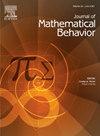克服证明过程中的僵局:新手证明者在遇到瓶颈时的富有成效的行动
IF 1
Q3 EDUCATION & EDUCATIONAL RESEARCH
引用次数: 0
摘要
研究表明,许多本科生都在努力学习证明,包括那些主修数学的学生(Moore, 1994;塞尔登,2012)。虽然研究已经探索了专家数学家如何构建证明来指导教学实践,但专家策略可能对证明能力有限的新手证明者并不同样有益。新手证明者在从事解决问题或证明任务时经常面临困难和僵局。通过僵局的镜头,本研究通过描述新手证明者在遇到僵局时的导航行为来更好地支持他们的证明过程,提供了一个更细致的描述。这项研究利用了对参加过渡证明课程的本科生进行的基于任务的访谈。开发了一个框架,以确定学生在验证过程中遇到瓶颈时采取的富有成效的行动。这项研究的结果表明,围绕卡住点的富有成效的行动可以培养学生重要的证明技能,即使学生最终没有成功地完成证明。因此,鼓励教师认识并支持这些富有成效的行动,在指导学生进行证明过程时,优先考虑他们而不是仅仅完成证明。本文章由计算机程序翻译,如有差异,请以英文原文为准。
Overcoming impasses in proving processes: Novice provers’ productive actions when encountering stuck points
Research has shown that many undergraduate students struggle to learn to prove, including those who major in mathematics (Moore, 1994; Selden, 2012). While studies have explored how expert mathematicians construct proofs to inform teaching practices, expert strategies might not be equally beneficial to novice provers with limited abilities in proving. Novice provers often face difficulties and impasses when engaged in problem-solving or proving tasks. Looking through the lenses of impasses, this study provides a more fine-grained account by characterizing novice provers’ navigating actions when they encounter impasses to better support them in their proving processes. This research draws on task-based interviews conducted with undergraduates enrolled in a transition-to-proof course. A framework was developed to identify productive actions students took when navigating stuck points in the proving process. The result of this study shows that productive actions around stuck points can develop important proof skills in students, even if the student did not ultimately complete the proof successfully. Therefore, instructors are encouraged to recognize and support these productive actions, prioritizing them over mere proof completion when guiding students in their proving processes.
求助全文
通过发布文献求助,成功后即可免费获取论文全文。
去求助
来源期刊

Journal of Mathematical Behavior
EDUCATION & EDUCATIONAL RESEARCH-
CiteScore
2.70
自引率
17.60%
发文量
69
期刊介绍:
The Journal of Mathematical Behavior solicits original research on the learning and teaching of mathematics. We are interested especially in basic research, research that aims to clarify, in detail and depth, how mathematical ideas develop in learners. Over three decades, our experience confirms a founding premise of this journal: that mathematical thinking, hence mathematics learning as a social enterprise, is special. It is special because mathematics is special, both logically and psychologically. Logically, through the way that mathematical ideas and methods have been built, refined and organized for centuries across a range of cultures; and psychologically, through the variety of ways people today, in many walks of life, make sense of mathematics, develop it, make it their own.
 求助内容:
求助内容: 应助结果提醒方式:
应助结果提醒方式:


